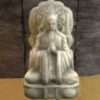What were some of the fundamentals about his thoughts or ideas? The analects of Confucius are a collection of works of his basic socio-political doctrines, and his teaching on social justice and compassion. He spoke of the need for loyalty and centralized authority, but not blind obedience. This is why his teachings would later result in a variety of tests for lower level political officials. He had guidelines for who was a fit leader, and they didn’t relate to military might. These guidelines are still being used to this day.
When exactly did it end being influent in Chinese society? Actually hasn’t ended, but in fact China entered an age of reason at about the same time the west did. What differed was they were reluctant to undertake industrialization, and their hesitancy seems like it would have been wisdom now. But world pressures forced the issue to put them on equal trade footing.
Confucianism is very “communal”, so they give moral weight to communism and is likely why Chinese communism still exists. Some say Marxism sparked Chinese communism, but that is sort of debatable.
How does Confucianism fare against regional religions like Buddhism? The Chinese are very eclectic about religion as a culture. Their only dissonance between the two schools of belief is focus. So Buddhism in China is more dominant, because although communist as a government the Chinese in general are very individually focused. This is why Sun-Tzu had some of the military doctrine he did. He was Buddhist and saw that the way of leadership was in cultivating his soldiers, not in any communal agenda. Giving each soldier work according to their strengths. It is the governing philosophy of modern Japanese corporate policy, and isn’t absent from Chinese thinking either. Though Sun-Tzu had serious criticisms of civic government which is not popular with the current Chinese state. So Confucianism as a “religion” in the modern term isn’t one, but in the classic sense of the word (religio being its root word which meant only a body of practices), Confucianism is that. It has ceremonies and observances, because they promote community unity and harmony.
So Buddhists that are Confucians are in peace or in conflict with themselves? At peace. Nothing in Buddhist doctrine speaks against the communal view, but some purists in the Confucianist school do criticise Buddhism for its individual focus. So Confucius is truly a philosopher, which you choose to listen or not. His teachings were based on ethics, and to this day his ethical arguments still bear weight, but short of the smaller sect that see him as the emperor of heaven, Confucianism is a coherent body of ethical doctrine.
Your thoughts are welcome. Be well friends.
Travis Saunders
Dragon Intuitive
~science,mysticism,spirituality~



Leave a Reply